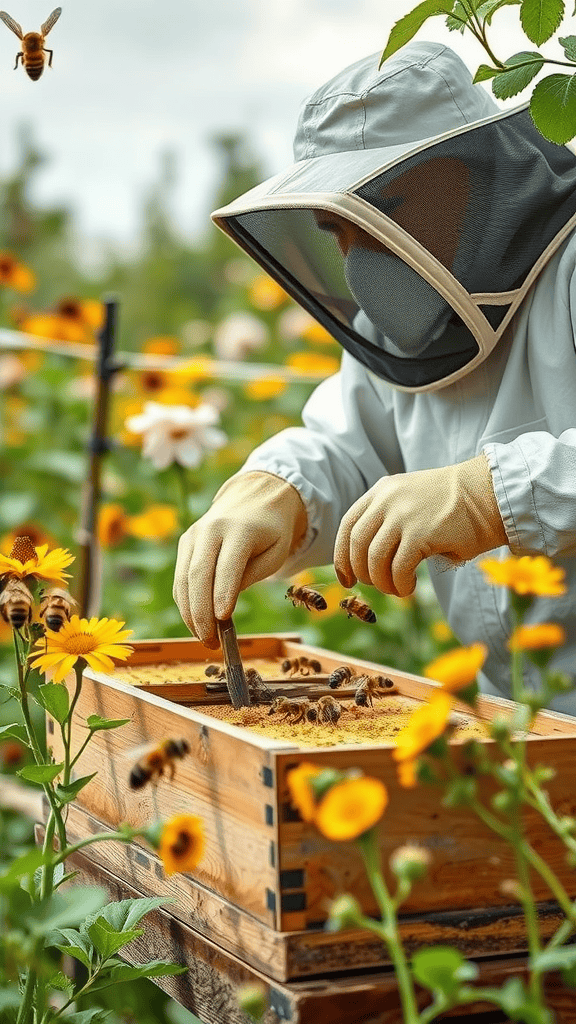Understanding the Basics of Garden Beekeeping
Are you curious about the fascinating world of bees and how you can start your own garden beekeeping adventure? Garden beekeeping is a rewarding hobby that not only supports local ecosystems but also produces delicious honey and enhances your garden. Let’s dive into what garden beekeeping involves, how to get started, and its many benefits.
Understanding the Essentials
Garden beekeeping, sometimes referred to as backyard beekeeping, involves maintaining bee colonies in a controlled environment, typically in your backyard or garden. This practice helps to pollinate plants, which is vital for growing fruits, vegetables, and flowers. You’ll also gain first-hand insight into bee behavior and the ecosystem.
Choosing the Right Beehive
Your journey begins with selecting the right type of beehive. The most common types include:
- Langstroth Hive: This is the most widely used hive, featuring removable frames for easy inspections and honey harvesting.
- Top-Bar Hive: This hive is more natural and allows bees to build their comb freely. It’s an excellent option for beginners.
- Flow Hive: This modern innovation allows for easy honey harvesting with minimal disturbance to the bees.
Choose a hive that suits your gardening style and comfort level as a beekeeper. A good hive will provide a safe and comfortable home for bees, making it essential for their health and productivity.
Location Is Key
When starting garden beekeeping, the location of your beehive is crucial. Here are some tips to consider:
- Ensure the hive gets plenty of sunlight, ideally in the morning.
- Place it in a location that is sheltered from strong winds.
- Avoid positioning the hive directly next to people or pets to minimize disturbances.
Having flowers nearby can provide a constant food source for your bees, creating a thriving environment. Select diverse plants that flower throughout the growing season to keep the bees busy and happy.
Essential Equipment
Aside from a suitable beehive, you will need some essential equipment for successful garden beekeeping:
- Bee Suit: Protects you from bee stings while you work with your hive.
- Smoker: Used to calm the bees during inspections.
- Hive Tool: This handy tool helps you pry apart frames and manage the hive.
- Bee Brush: Useful for gently moving bees off frames while harvesting honey.
- Jars and Bottles: For collecting and storing honey once it’s harvested.
Having the right equipment ensures you can care for your bees effectively while minimizing risks of injury or stress to the colony.
Understanding Bee Seasons
Your management tasks will vary throughout the year according to bee seasons. Here’s a quick breakdown of what to expect:
- Spring: This is the most active season for bees. They start building up their population and foraging for nectar.
- Summer: The hive will be busy producing honey. It’s vital to monitor for signs of swarming.
- Fall: Prepare the hive for winter. You may need to reduce the entrance and ensure they have enough food stores.
- Winter: Bees cluster together to keep warm. Minimal intervention is required during this season.
Understanding these seasonal changes helps you plan your beekeeping activities effectively for maximum yield and bee health.
The Benefits of Garden Beekeeping
Engaging in garden beekeeping offers a plethora of benefits:
- Pollination: Helping your garden thrive by encouraging plant growth.
- Honey Production: Enjoy the taste of fresh, home-harvested honey.
- Ecosystem Support: Contributing positively to the environment and biodiversity.
- Educational Experience: Learning about bee behavior and the vital roles they play in nature.
In essence, garden beekeeping provides not only tangible benefits in terms of produce and honey but also fosters a deeper appreciation for nature and the intricate relationships within it.
As you embark on your garden beekeeping journey, you’ll find it can be a fulfilling experience that enriches both your garden and your life. Happy beekeeping!
The Benefits of Integrating Beekeeping into Your Garden Ecosystem
Integrating beekeeping into your garden ecosystem can be a transformative experience, benefiting both your plants and local bee populations. Garden beekeeping is not just about having a few hives; it’s about creating a thriving environment that encourages biodiversity. By understanding the many benefits of keeping bees in your garden, you can enhance not only your gardening efforts but also contribute positively to the environment.
Enhanced Pollination
One of the most significant advantages of garden beekeeping is improved pollination. Bees are exceptional pollinators, and having them in your garden can dramatically increase the yield of flowering plants. Here’s how:
- Higher Fruit and Vegetable Production: With bees buzzing around, crops like tomatoes, squash, and berries thrive. This leads to a greater harvest.
- Improved Flowering: Many flowering plants are more vibrant and experienced prolonged blooming periods, leading to a colorful and lush landscape.
Boosting Biodiversity
Bees are crucial players in maintaining biodiversity. By integrating beekeeping into your garden, you’re creating a habitat that supports not only bees but various other pollinators. This enhances the ecosystem in numerous ways:
- Supports Other Wildlife: A bee-friendly garden attracts butterflies, birds, and beneficial insects, creating a balanced ecosystem.
- Diverse Plant Life: Wider variety of plants leads to a healthier environment, sustaining more wildlife.
Natural Fertilization
Using bees in your garden can also lead to natural fertilization. As bees move from flower to flower, they help to cross-pollinate plants. This process enhances genetic diversity and strengthens the plants, which is essential for resilient crops. Think of it as nature’s way of ensuring that future generations of plants exhibit strong traits.
Honey Production
One of the most delightful benefits of beekeeping is honey production. When you manage a few hives, you’ll be able to enjoy the fruits of your labor in delicious honey. This sweet reward offers you numerous advantages:
- Homegrown Honey: Fresh honey adds natural sweetness to your meals without the additives found in store-bought varieties.
- Medicinal Benefits: Honey boasts numerous health benefits, from soothing sore throats to acting as a natural energy booster.
Educational Opportunities
Beekeeping provides a unique learning experience for yourself and your family. It can instill a sense of responsibility and knowledge about nature’s workings. Engaging with bees lets you:
- Learn About Ecosystems: Understanding the role bees play in our environment sparks curiosity.
- Observation Skills: Watching bee behavior can improve your patience and observation skills, offering lessons about nature.
Reducing Stress and Enhancing Well-Being
Gardening itself is known for its stress-relief benefits, and incorporating beekeeping can amplify this effect. Working with bees can be a meditative experience. Spending time in your garden among bees promotes mindfulness, allowing you to unwind and connect with nature. Additionally, observing these industrious creatures can inspire tranquility and joy.
Environmental Impact
Participating in beekeeping is an excellent way to contribute to environmental efforts. With many bee populations declining due to habitat loss and pesticide exposure, your garden can become a sanctuary:
- Supporting Local Ecosystems: Your hives help bolster local bee populations.
- Promoting Sustainability: Beekeeping can be part of your larger effort to live sustainably.
Beekeeping into your garden can offer countless benefits, from enhanced pollination and biodiversity to honey production and overall improved wellness. Not only does it enrich your gardening experience, but it also fosters a thriving environment for our hardworking bee friends. By embracing garden beekeeping, you’re investing in a more sustainable and vibrant future for both your garden and the ecosystem at large.
Conclusion
Garden beekeeping offers a wonderful opportunity to enhance your gardening experience while supporting local ecosystems. By understanding the basics of this fascinating practice, you can create an inviting environment for bees that not only benefits these essential pollinators but also improves the productivity of your garden. Healthy blooms and crops thrive with the diligent work of bees, transforming your garden into a vibrant landscape filled with life.
Integrating beekeeping into your gardening routine brings a host of benefits. You’ll enjoy increased pollination, leading to healthier and more abundant plants. Plus, having your own hive allows you to harvest fresh honey, which can be both a rewarding and delicious perk. Additionally, beekeeping fosters a deeper connection with nature, educating you about the importance of these insects and the critical role they play in our ecosystem.
Taking small steps towards garden beekeeping can yield great results. Start by selecting the right location for your hive, ensuring it gets plenty of sunlight and is sheltered from harsh winds. As you progress, learn to respect and understand bee behavior, fostering a safe environment for both you and the bees.
By embracing garden beekeeping, you’ll not only elevate your gardening game but also contribute to the sustainability of our planet. This enriching endeavor is perfect for anyone looking to make a positive impact while enjoying the beauty and bounty of their garden. So why not take the plunge and discover what this rewarding hobby can bring to your gardening journey? Your plants, and the bees, will thank you!
As an Amazon Associate, I earn from qualifying purchases.

